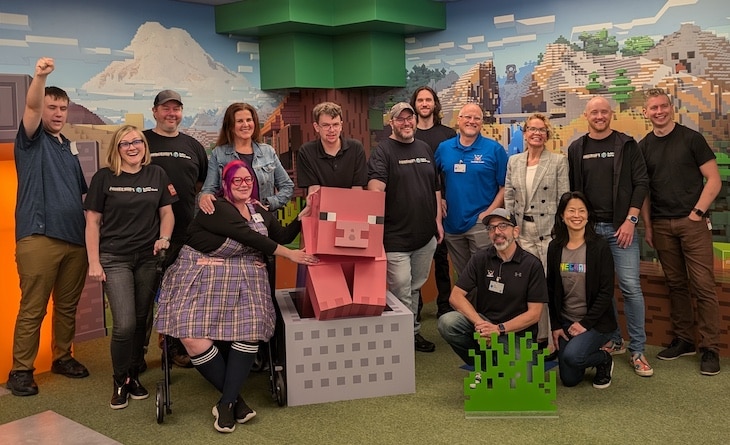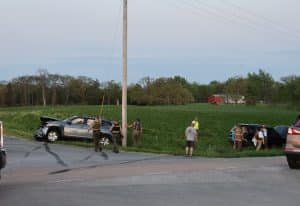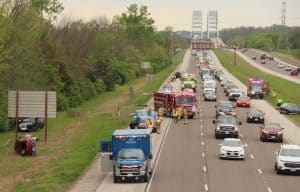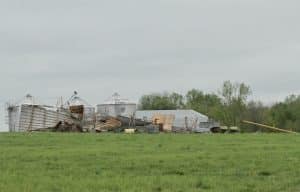Esports offers tools to build

A local esports athlete with a passion for broader IT work recently participated in a national event through Special Olympics, highlighting the importance of accessibility and inclusion in video games.
PJ Broske is a Waterloo resident who has been involved with Illinois Special Olympics for some time. As Broske recalled, he started out as an athlete when he was 8, playing soccer, basketball and bowling over the years.
Now 24, Broske’s interests have largely turned toward video games and esports.
Jonathan Frederick, who serves as the director for Unified Initiatives and Esports within Special Olympics Illinois, said Broske has been involved with this program for upwards of four years.
Broske is a graduate of Missouri State University, having studied information technologies.
When it comes to games, Frederick said Broske’s esports interest previously included the football game Madden NFL, though he now focuses on Rocket League – a game where teams essentially play soccer by driving rocket-powered cars – and Minecraft.
The latter is a hugely popular game in which players can gather resources to survive in a randomly-generated environment or express their creative talents as they build whatever they can think of using the game’s wide array of tools and literal building blocks.
Through his IT passion and work with Special Olympics Illinois, Broske was recommended by Frederick to participate in one aspect of Gaming for Inclusion 2024, a partnership between Microsoft Xbox and Special Olympics centering around an esports tournament.
This year’s competition was a Rocket League tourney, and though the game is among his esports interests, Broske’s participation in the event actually took place elsewhere as he was one of three athletes from around the country who were invited by Microsoft to participate in a Unified Minecraft build challenge.
As Microsoft owns Mojang, the company which develops Minecraft, Broske and his fellow athletes were brought to the company’s headquarters in Redmond, Wash.
There, they were joined by some of the game’s developers, teaming up within the game to construct items related to Special Olympics.
During and after the build challenge, athletes spoke with developers to discuss both the impact Minecraft has had on them as well as the importance of inclusion and accessibility in video games as a whole.
Broske and his fellows also enjoyed a tour of Mojang headquarters, meeting with Xbox CEO Phil Spencer to discuss accessibility and being interviewed further to discuss their relationships with esports and video games.
PJ’s father Paul Broske joined him on the trip and, in an interview which aired during the Gaming for Inclusion livestream on Oct. 5, spoke about the impact games have had on his son.
“At a young age, he was pretty much nonverbal, and through time and through training, he grew, but the gaming has opened him up even more, and he’s able to communicate, collaborate and build worlds with friends of his that they enjoy tremendously,” Paul said.
Also within the interview, PJ himself noted how leadership skills have been his biggest takeaway from his time as an esports athlete.
Speaking with the Republic-Times, PJ said that his participation in the event seemed to come out of nowhere with Frederick recommending him for the program.
He briefly recalled some of the discussion items he touched on with his fellow athletes and the Minecraft developers they spoke with, particularly noting a setting within the game to make things more accessible for those who suffer from seizures by removing or reducing flashing lights.
Also mentioned were special controllers designed to be easier to hold and manipulate for those with physical disabilities.
These and other accessibility options, PJ said, simply serve to reduce limits and remove barriers, allowing for more people to enjoy the hobby.
PJ spoke generally about his positive experiences in esports, noting how video games have provided him with a competitive hobby. He further expressed an affinity for making different builds in Minecraft.
He also had good things to say about the visit to Mojang headquarters, having made new friends during the event.
“I really had a great time up in Redmond,” PJ said. “When I met the two other people out there at the headquarters, it made new friendships come together. We wanted to set up our own group chat after we were done with our event so we can start playing more often.”
Paul also offered his thoughts on the value of accessibility for games and the place video games have in the world, having witnessed the impact such a hobby has had on his son.
“It’s amazing how much gaming has played a part in the younger generations,” Paul said. “I see it as a powerful tool to reach young children and maybe help them in the future with possible career goals or paths.”
Frederick echoed this sentiment. Having been introduced to esports during his time working at a high school, he has come to appreciate how open the hobby is for everyone.
He added that a key part of his work with Special Olympics Illinois is striving to make space for everyone to enjoy these games.
“It’s accessible for everyone, especially in that scholastic environment,” Frederick said. “Most everyone can game… Having the developers of games that we play on the regular and higher-ups at Microsoft reach out and take an interest in hearing directly from our athletes, that in itself is a pretty big deal.”






